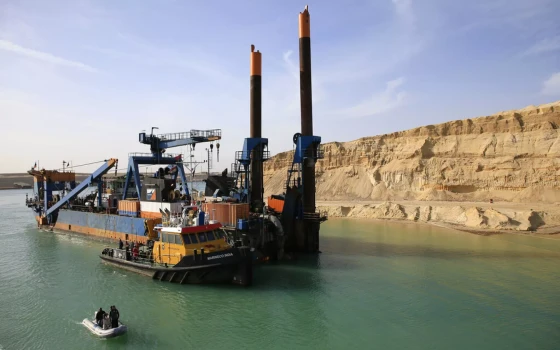
Will the Suez Canal return to its pivotal role and compensate for losses after the ceasefire in Gaza?

- Europe and Arabs
- Saturday , 25 January 2025 8:36 AM GMT
Cairo - Brussels: Europe and the Arabs - Agencies
In a move that reflects cautious hope, Egyptian Minister of Foreign Trade and Investment Hassan al-Khatib expressed his hope that the ceasefire between Israel and Hamas would restore navigation in the Suez Canal, which has witnessed a decline of more than 60% during the past period, according to a report published by Bloomberg.
In a statement during an interview with Bloomberg on the sidelines of the Davos Economic Forum in Switzerland, al-Khatib said: "We do not expect an immediate return to navigation in the canal as it was. We will study the situation and begin a dialogue with ship owners." According to what was reported by the European news network in Brussels "Euronews"
These statements come at a time when this strategic waterway is witnessing a significant decline in its movement, as a result of the Houthis targeting ships in the Red Sea in late 2023, in solidarity with Hamas. Despite the start of a new truce in Gaza for a period of six weeks, a full recovery of traffic in the canal remains out of reach. In a related context, the return of normal activity to the canal is considered a strong boost to the Egyptian economy, which is suffering from the worst economic crisis in decades. Last March, the authorities allowed the Egyptian pound to devalue by 40%, which helped secure new funding from the International Monetary Fund and others as part of a $57 billion global rescue program.
For their part, the Houthis announced their commitment to stop targeting American and British ships after the ceasefire, which may reduce security threats in the Red Sea. However, major shipping companies, such as "AP Moller-Maersk", stressed that it is too early to plan to return to the region. Statistics indicate that Egypt lost more than $7 billion last year due to these disturbances.
On the government level, Al-Khatib explained that the current monetary policy is based on targeting inflation and a flexible exchange rate, factors that he considers attractive to foreign investors. He added that Egypt seeks to expand the base of foreign direct investment as part of its plans to stimulate economic growth. It is worth noting that Al-Khatib, who held prominent positions in global financial institutions, such as the European Bank for Reconstruction and Development, has extensive experience in managing direct investments and equity funds, which enhances the chances of success of the government’s plans to attract investments.












No Comments Found